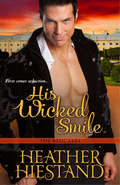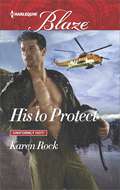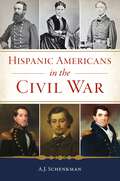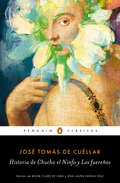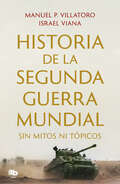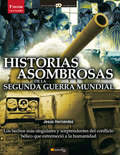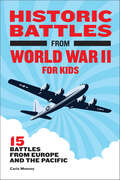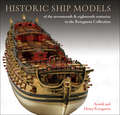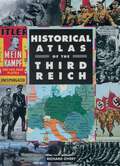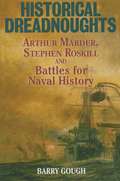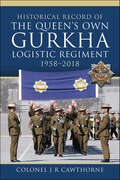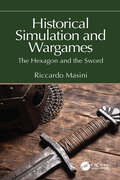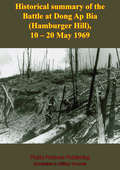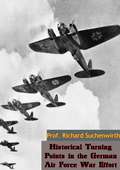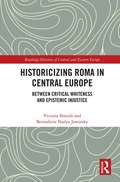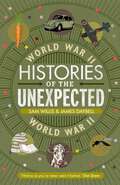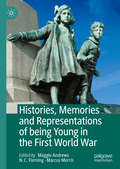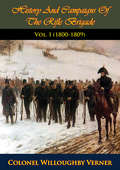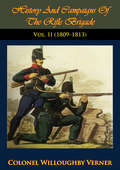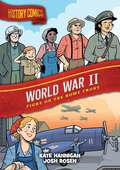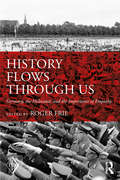- Table View
- List View
His Wicked Smile (The Redcakes #3)
by Heather HiestandIn this Victorian romance, a bakery heir&’s path to high society takes a detour after succumbing to temptation with a ravishing widow. Ann Haldene is the most beautiful woman Gawain Redcake has ever seen. A gifted healer who soothes his battle-scarred body like never before, the widow&’s touch has a powerful effect on him. It&’s no wonder the rugged Redcake heir forgets his quest for a society bride during one passionate night in Ann&’s arms. But once he learns she is pregnant with his child, he searches for her, intent on giving her his name, if not his heart . . . Ann is shocked by Gawain&’s proposal, mostly because he has not uttered a word of love. For the sake of their baby, she accepts, even knowing that Gawain dreamed of marrying to secure a title and all she has is a severed royal Indian bloodline. Now the new bride faces her greatest challenge: showing her husband that their union is more powerful than pedigree—and love is the ultimate reward . . . &“A delightful, sexy glimpse into Victorian life and loving with two wonderfully non-traditional lovers.&” —Jessa Slade, author of Dark Prince&’s Desire and the Steel Born series &“This fast-paced read is both sweet and fun. It&’s rare to find historical romances that feature couples who are of anything but Anglo-Saxon decent, and this one does a solid job of addressing some of these difficulties.&” —Library Journal
His to Protect
by Karen RockSubject: Lt. Commander Mark Sampson Mission: Keep his eyes on the skies...despite one sexy distraction! There are things a man can never undo. For Coast Guard search and rescue pilot Mark Sampson, it was the agonizing decision that cost him a teammate-and his faith in himself. But an unbelievably sexy blonde on a secluded beach may help him forget...if only for a night. Cassie Rowe needed a distraction-and, boy, did she get one! How was she to know the brooding stranger who rocked her world was the pilot who'd left her brother to die? And now they're on the same mission. She should hate him. But she can't fight the storm of desire threatening to pull them under...
Hispanic Americans in the Civil War (Civil War Series)
by A. J. SchenkmanForgotten Fighters and Unknown ExploitsMore than twenty thousand Hispanic Americans served in the Civil War. When Cuban-born Loreta Janeta Velázquez’s husband would not allow her to join him on the battlefield, she assumed the role of First Lieutenant Harry T. Buford to be near him. Philip Bazaar, born in Chile, was awarded the Medal of Honor for his courageous exploits during the assault of Fort Fisher. The spying efforts of Floridian Maria Dolores “Lola” Sánchez and her two sisters led to a Union defeat at the Battle of Horse Landing. Union Admiral David Farragut, of Spanish descent, was not only the navy’s first admiral, but he was also the man who uttered the famous phrase, “Damn the torpedoes, full speed ahead.” Delving into the lives of these figures and more, A.J. Schenkman uncovers this often-overlooked aspect of Civil War history.
Hispanic Representation in the Department of Defense Civilian Workforce: Trend and Barrier Analysis
by Nelson Lim Kimberly Curry Hall Abigail Haddad Miriam Matthews Bruce R. Orvis ZavislanHispanics are less represented in the U.S. Department of Defense (DoD) civilian workforce than in the federal civilian workforce and the civilian labor force. This report assesses what factors might account for Hispanic underrepresentation in DoD. It includes assessments of trends in Hispanic employment and analyses of job applicant data. It also presents findings from interviews with representatives of DoD and of Hispanic-serving institutions.
Historia de Chucho el Ninfo y Los fuereños
by José Tomás de CuéllarUn volumen que reúne dos de las novelas más destacadas del gran novelista mexicano del siglo XIX, José Tomás de Cuellar. Edición a cargo de Belem Clark de Lara y Ana Laura Zavala Díaz, investigadoras del Seminario de Edición Crítica de Textos del Instituto de Investigaciones Filológicas de la UNAM y especialistas en la literatura mexicana del siglo XIX. "Chucho repugnaba la acentuación varonil y combatía en su fisonomía la venida de esas líneas que deciden el aspecto viril" En Historia de Chucho el Ninfo, José Tomás de Cuéllar evidencia las desastrosas consecuencias, morales y sociales, del deterioro de las costumbres de la sociedad de su tiempo, que producía niños como Chucho, mimados en extremo y entregados sólo al culto desmedido de la belleza y la superficialidad. Completa el volumen la novela corta Los fuereños, en la que Facundo relata, con el humor y la agudeza crítica que lo caracterizó, las peripecias y dificultades que enfrenta una familia del interior de la república en una ciudad de México en pleno proceso de modernización.
Historia de la Segunda Guerra Mundial sin mitos ni tópicos
by Israel Viana Manuel P. VillatoroLa historia de la Segunda Guerra Mundial como jamás nos la han contado, con una mirada experta y al mismo tiempo muy cercana En Historia de la Segunda Guerra Mundial sin mitos ni tópicos, Manuel P. Villatoro e Israel Viana, periodistas especializados en historia, nos acercan al conflicto más grande de todos los tiempos bajo la premisa de una pulgación fresca y amena, en la que se incluyen varias exclusivas jamás contadas, fruto de la investigación de los autores. Sin olvidar los hechos previos al enfrentamiento, ni sus largas consecuencias en el corto siglo XX, el libro ofrece una crónica de la guerra año por año, atenta a sus entresijos y al enorme sufrimiento humano que supuso. Se encontrarán aquí entrevistas con algunos de los últimos supervivientes y los acontecimientos bélicos más destacados, como la invasión de Polonia por las tropas del Tercer Reich o las asfixiantes batallas marítimas en el interior de los submarinos, pero también aparecerán pinceladas sobre detalles como el funcionamiento del Panzer, las obsesiones eróticas de Hitler y Mussolini, el desempeño de las mujeresespías en el frente o el desesperado encargo hecho por el Kremlin a Dmitri Shostakóvich de estrenar su Sinfonía n.º 7, con una orquesta diezmada, en la ciudad sitiada de Leningrado. Villatoro y Viana, dos colosos del periodismo, nos ofrecen una historia a escala humana, inteligente y ágil, capaz de desvelar la realidad política y personal de un pasado que no deja de ser noticia. Sobre el volumen: desconocidos de la Segunda Guerra Mundial».
Historias asombrosas de la Segunda Guerra Mundial (Historia Incógnita)
by Jesús Hernández MartínezUna ingeniosa recopilación de hechos y episodios históricos poco conocidos, que marcaron el día a día de este convulso periodo histórico, pero que han quedado fuera de los grandes libros de historia
Historic Battles from World War II for Kids: 15 Battles from Europe and the Pacific (Historic Battles for Kids)
by Carla MooneyAn up-close look at the battles of World War II for kids ages 8 to 12Help kids learn all about World War II—right from the front lines. This fascinating guide focuses on the battles that decided the outcome of the war. Each entry puts kids directly in the general's seat, walking them through the flow of battle as well as the strategies, tactics, and technology that made the difference between victory and defeat.Go beyond other World War 2 books for kids with:15 key conflicts—Kids will dive deep into well-known and lesser-explored battles alike, from the Attack on Pearl Harbor to the Battle of Crete.Battlefield basics—Each chapter starts off a quick breakdown of the battle, including dates, objectives, and what was at stake.Closer looks—Young learners will find out even more with the help of technological explorations, battle maps, by-the-numbers sidebars, and more.Give kids an exciting new perspective on World War 2 history!
Historic Fort York, 1793-1993
by Carl Benn Henry N.R. JackmanFearing an American invasion of Upper Canada, John Graves Simcoe had Fort York built in 1793 as an emergency defensive measure. That act became the first step in the founding of modern Toronto. Twenty years later, the Fort was the scene of the bloody Battle of York in which the famous American explorer, Zebulon Pike, died leading U.S. forces against the Fort’s outnumbered Canadian, British and Aboriginal defenders. The Americans won this battle – their first major victory in the War of 1812 – and torched the province’s public buildings during a six-day occupation. A year later, British forces retaliated by capturing Washington and burning its government buildings, including the White House. Rebuilt in time to drive off another American attack in 1814, Fort York was maintained through the 1880s to guard against internal unrest and potential American annexation. Even after its defences became obsolete, Fort York continued to serve as barracks and training grounds for the Toronto garrison until the 1930s, when it reopened as a historic site museum. In this book, Carl Benn explores the dramatic roles Fort York played in the frontier war of the 1790s, the birth of Toronto, the War of 1812, the Rebellion of 1837 and the defence of Canada during the American Civil War, and describes how Toronto’s most important heritage site came to be preserved as a tangible link to Canada’s turbulent military past.
Historic Houses of New Jersey: [Illustrated Edition]
by W. Jay MillsOne of the standard works on notable early houses in the state.“UNTIL now the State possessing the most inexhaustible supply of colonial, Revolutionary, and republican souvenirs has been almost neglected. Indeed, few of the original thirteen States can be compared with New Jersey in the number and importance of its landmarks. Her society, too, was as intellectual as that which sprang from the rocks of Puritanism, and it formed a brilliant pageant, rivalling the glittering line of the cavaliers. There is scarcely an acre of soil in the northern part of the State not once pressed by the foot of the Revolutionary soldier, and there are few of the many hundreds of dwellings which have survived the march of a century that did not shelter at one time or another some of the heroes of ‘76, or the colonial dames and daughters who played scarcely less potent parts in the drama of our struggle for freedom. This is the only book to tell the true story of the old houses of New Jersey, and such a record possesses deep significance for every American, as it has much more than a local or State interest.Of the glowing and passionate pictures of early days little more than the frames and the sentiment lingering about them now remain. It has been the author’s pleasure to fill in the frames with the portraits and the scenes that history and tradition, as contained in family recollection, in unpublished letters, and in local records suggest. Anecdote and gossip have supplied him with many a side-light on the great figures and their stirring times, and their chronicler will be satisfied if his story shall make more real the facts with which fancy delights to play.”
Historic Ship Models: of the seventeenth & eighteenth centuries in the Kriegstein Collection
by Arnold Kriegstein Henry KriegsteinIn terms of quality, historical significance and sheer numbers, the Kriegstein family’s ship model collection in the United States is the finest in private hands anywhere in the world. Principally made up of official 17th- and 18th-century models in the Admiralty or Navy Board style, the collection is unrivalled by any museum outside the British national collection at Greenwich. As the models are not on public display, this book fills the need for a detailed catalogue and visual reference with superb colour photos of all the models, both overall portraits and multiple close-ups. Apart from lengthy descriptions of these magnificent artefacts, space is devoted to how they were identified, and the valuable research done by Arnold and Henry Kriegstein, the identical twins whose shared passion brought this all together. Beyond the technicalities of the ships, the story has a human dimension in the brothers’ adventures in pursuit of every model and their dogged determination to secure them against official obstruction and dubious antiques-trade practices. This is an entirely new and revised edition of Seventeenth and Eighteenth Century Ship Models first published in 2007, now expanded to include the additions to the collection since that date.
Historical Atlas of the Third Reich
by Richard OveryFormally inaugurated in Potsdam in 1933, the Third Reich was regarded by Hitler as the greatest in a line of might German empires. His mystical belief that this empire would last a thousand years proved unfounded, but not before a world war which resulted in the loss of at least 70 million lives. This atlas charts the rise and fall of Hitler's Nazi state, from the first mass meeting of the NSDAP in Munich in 1920, through the relentless territorial aggression and anti0Jewish atrocities of World War II, to the execution of war criminals in Nuremburg in 1946.The Historical Atlas of the Third Reich offers penetrating insights into the seemingly inexorable rise of National Socialism and examines the nature of Hitler's power structures both within his party and within Germany as a whole.
Historical Dreadnoughts: Arthur Marder, Stephen Roskill and Battles for Naval History
by Barry GoughThis is the story of the remarkable, intersecting careers of the two greatest writers on British naval history in the twentieth century the American professor Arthur Marder, son of immigrant Russian Jews, and Captain Stephen Roskill, who knew the Royal Navy from the inside. Between them, these contrasting characters were to peel back the lid of historical secrecy that surrounded the maritime aspects of the two world wars, based on the privileged access to official papers they both achieved through different channels.Initially their mutual interests led to a degree of friendly rivalry, but this was to deteriorate into a stormy academic feud fought out in newspaper columns and the footnotes of their books much to the bemusement (and sometimes amusement) of the naval history community. Out of it, surprisingly, emerged some of the best historical writing on naval themes, and a central contribution of this book is to reveal the process by which the two historians produced their literary masterpieces.Anyone who has read Marders From the Dreadnought to Scapa Flow or Roskills The War at Sea and they were both bestsellers in their day will be entertained and enlightened by this story of the men A J P Taylor called our historical dreadnoughts.This is the story of the remarkable, intersecting careers of the two greatest writers on British naval history in the twentieth century the American professor Arthur Marder, son of immigrant Russian Jews, and Captain Stephen Roskill, who knew the Royal Navy from the inside. Between them, these contrasting characters were to peel back the lid of historical secrecy that surrounded the maritime aspects of the two world wars, based on the privileged access to official papers they both achieved through different channels.Initially their mutual interests led to a degree of friendly rivalry, but this was to deteriorate into a stormy academic feud fought out in newspaper columns and the footnotes of their books much to the bemusement (and sometimes amusement) of the naval history community. Out of it, surprisingly, emerged some of the best historical writing on naval themes, and a central contribution of this book is to reveal the process by which the two historians produced their literary masterpieces.Anyone who has read Marders From the Dreadnought to Scapa Flow or Roskills The War at Sea and they were both bestsellers in their day will be entertained and enlightened by this story of the men A J P Taylor called our historical dreadnoughts.
Historical Record of The Queen’s Own Gurkha Logistic Regiment, 1958–2018
by Colonel J. R. CawthorneThe Gurkha Army Service Corps, the predecessor of The Queen’s Own Gurkha Logistic Regiment, was raised in Singapore in 1958 ten years after the transfer of Gurkha regiments from the Indian Army to the British Army and towards the end of the Malayan Emergency. Within four years of being formed, it was committed to continuous operations in Brunei and Borneo during Confrontation with Indonesia between 1962-66. It was also redesignated the Gurkha Transport Regiment in 1965 to reflect changes to the Army’s logistic structure. Between 1966-71, the Regiment was substantially reduced in size, along with the rest of The Brigade of Gurkhas, as Britain withdrew its forces from East of Suez. Concentrated in Hong Kong, the Regiment provided transport support to the Garrison for the next 20 years. In 1991, a composite squadron was sent to reinforce British Forces in the Gulf War after which, in preparation for the handback of Hong Kong to China, the Regiment moved to and became permanently stationed in the UK. In recognition of its past services, it was granted the royal title ‘The Queen’s Own Gurkha Transport Regiment’ in 1992. The following two decades saw it undertake multiple operational tours to the Balkans, Iraq, Cyprus and Afghanistan as well as providing humanitarian assistance to the Ebola crisis in Sierra Leone. It also expanded both its role, to incorporate supply and catering, and size, which led in 2001 to it being redesignated to its current title ‘The Queen’s Own Gurkha Logistic Regiment’. This history records the events and activities of the Regiment during its first 60 years of service to the Crown. While of wider interest to military historians, it is principally written for members of the Regiment, past, present and future.
Historical Simulation and Wargames: The Hexagon and the Sword
by Riccardo MasiniThis book is a comprehensive study on analog historical simulation games, exploring both their theoretical concepts and practical solutions. It considers the various ways used by simulation games to depict the different dynamics of historical events and analyzes how commercial analog miniature and board wargames can become valuable tools for historical research and provide a more modern and captivating interpretation of past events.The nature of “simulation” is discussed, exposing its differences with other forms of ludic activity, both analog and digital, as well as intellectual speculation. Many of the most common game mechanics are analyzed in depth and in their practical use, to answer whether “reconstructive” simulations dedicated to historical episodes can provide valuable, reliable and useful insights for researchers. It critically examines the challenges presented to game designers that look to produce an accurate (even if not necessarily complex) simulation of historical events.The book will be of great interest to those curious about the potential applications of such a powerful research and experimental tool for historical, sociologic and anthropologic research, as well as wargaming and board gaming enthusiasts looking to gain a deeper understanding of the inner workings of historical simulations.
Historical Summary Of The Battle At Dong Ap Bia (Hamburger Hill), 10-20 May 1969
by AnonIncludes 14 maps and diagrams.The battle at Dong Ap Bia (Hamburger Hill) occurred during Operation APACHE SNOW, a XXIV Corps directed operation in the Northern Ashau Valley. This operation was initiated on 10 May 1969 with the specific purpose of destroying North Vietnamese Army (NVA) and Viet Cong (VC) forces believed to be grouping in the Ashau Valley, blocking enemy routes of egress into Laos, interdicting enemy lines of communication and locating and destroying known enemy caches. Allied forces participating in the operation consisted of elements of the 101st Airborne Division, 3d Marine Division, and the 1st ARVN Division. Table of contents includes a background, the Battle at Dong Ap Bia (fire support, enemy losses, and U.S. casualties summaries), consideration of allegations by Senator Stephen M. Young, and a draft insert for congressional record.
Historical Turning Points in the German Air Force War Effort
by Prof. Richard SuchenwirthHistorical Turning Points in the German Air Force War Effort, first published in 1959, written by Professor Richard Suchenwirth, is one of a series of historical studies written by, or based on information supplied by former key officers of the German Air Force for the United States Air Force Historical Division.The overall purpose of the series is threefold: 1) To provide the United States Air Force with a comprehensive and, insofar as possible, authoritative history of a major air force which suffered defeat in World War II; 2) to provide a history of that air force as prepared by many of its principal and responsible leader; 3) to provide a firsthand account of that air force’s unique combat in a major war with the forces of the Soviet Union. This series of studies therefore covers in large part virtually all phases of the Luftwaffe’s operations and organization, from its camouflaged origin in the Reichswehr, during the period of secret German rearmament following World War I, through its participation in the Spanish Civil War and its massive operations and final defeat in World War II.These studies find their principal authority in their authors’ personal knowledge and experience. Thus, these studies are neither unbiased nor are they “histories” in the ordinary sense of that word. Instead, they constitute a vital part of the story without which the final history of Germany’s role in World War II cannot be written.
Historicizing Roma in Central Europe: Between Critical Whiteness and Epistemic Injustice (Routledge Histories of Central and Eastern Europe)
by Bernadette Nadya Jaworsky Victoria ShmidtIn Central Europe, limited success in revisiting the role of science in the segregation of Roma reverberates with the yet-unmet call for contextualizing the impact of ideas on everyday racism. This book attempts to interpret such a gap as a case of epistemic injustice. It underscores the historical role of ideas in race-making and provides analytical lenses for exploring cross-border transfers of whiteness in Central Europe. In the case of Roma, the scientific argument in favor of segregation continues to play an outstanding role due to a long-term focus on the limited educability of Roma. The authors trace the long-term interrelation between racializing Roma and the adaptation by Central European scholars of theories legitimizing segregation against those considered non-white, conceived as unable to become educated or "civilized." Along with legitimizing segregation, sterilization and even extermination, theorizing ineducability has laid the groundwork for negating the capacity of Roma as subjects of knowledge. Such negation has hindered practices of identity and quite literally prevented Roma in Central Europe from becoming who they are. This systematic epistemic injustice still echoes in contemporary attempts to historicize Roma in Central Europe. The authors critically investigate contemporary approaches to historicize Roma as reproducing whiteness and inevitably leading to various forms of epistemic injustice. The methodological approach herein conceptualizes critical whiteness as a practice of epistemic justice targeted at providing a sustainable platform for reflecting upon the impact of the past on the contemporary situation of Roma.
Histories of the Unexpected: World War II (Histories of the Unexpected)
by Sam Willis James DaybellThe Histories of the Unexpected series not only presents a new way of thinking about the past, but also reveals the world around us as never before. Traditionally, World War II has been understood in a straightforward way but the period really comes alive if you take an unexpected approach to its history. Yes, battles, bombs and bravery all have a fascinating history . . . but so too do handkerchiefs, furniture, Mozart, insects, blood, mothers, suicide, darkness, cancer and puppets! Each of these subjects is equally fascinating in its own right, and each sheds new light on the traditional subjects and themes that we think we know so well.
Histories, Memories and Representations of being Young in the First World War
by Maggie Andrews N. C. Fleming Marcus MorrisThis book seeks to place children and young people centrally within the study of the contemporary British home front, its cultural representations and its place in the historical memory of the First World War. This edited collection interrogates not only war and its effects on children and young people, but how understandings of this conflict have shaped or been shaped by historical memories of the Great War, which have only allowed for several tropes of childhood during the conflict to emerge. It brings together new research by emerging and established scholars who, through a series of tightly focussed case studies, introduce a range of new histories to both explore the experience of being young during the First World War, and interrogate the memories and representations of the conflict produced for children. Taken together the chapters in this volume shed light on the multiple ways in which the Great War shaped, disrupted and interrupted childhood in Britain, and illuminate simultaneously the selectivity of the portrayal of the conflict within the more typical national narratives.
History And Campaigns Of The Rifle Brigade Vol. I (History And Campaigns Of The Rifle Brigade #1)
by Colonel Willoughby VernerStory of The Rifle Brigade from its formation in 1800, its organization, uniform, equipment, arms and training and battles ending at Corunna in January 1809.The Rifle Brigade was formed in 1800 by detachments from various regiments as the 'Experimental Corps of Riflemen' initially and then 'Rifle Corps'. It was under this name that the new regiment first made its mark under Nelson in the following year at the Battle of Copenhagen. In 1803 it was designated the 95th (Rifle) Regiment and in 1816, after Waterloo, it was taken out of the numbered regiments of the line and styled 'The Rifle Brigade.' In this first part the author, who served in the regiment, traces the evolution of the Rifle Corps with the advent of the rifle, which replaced the musket, and its effect on tactics...Dress, drill, equipment and armament all feature and the important period spent at Shorncliffe when Sir John Moore, the father of the Light Brigade, commanded the garrison; he was then regarded as " the best trainer of troops England has ever possessed." The first taste of action came with the Ferrol Expedition in 1800 which had the destruction of the Spanish base. The 'Experimental Corps of Riflemen' contributed detachments numbering 170 under the command of Stewart. They were first ashore on 25th August and it was the only corps in action on that day, which henceforth was celebrated as the birthday of the Regiment. During the next nine years covered in this book the regiment served on many fronts--Copenhagen, Germany, Monte Video, Buenos Ayres and finally the Peninsula where the 2nd Battalion arrived on 12th July 1808 and fought its first action against the French, at Rolica on 17th August. This first part ends with the terrible retreat to and battle of Corunna in January 1809 where Moore "was struck down by a round shot ......the ball carrying away his left shoulder and leaving his arm hanging by the exposed tendons." Moore died of his wounds that same evening.--Print Ed.
History And Campaigns Of The Rifle Brigade Vol. II (History And Campaigns Of The Rifle Brigade #2)
by Colonel Willoughby VernerHistory of Rifle Brigade from 1809 to 1813 - mainly Peninsular War in which the regiment was involved from start to finish.On 10th May 1809 the strength of the 1st Battalion was 1,536 and the 2nd 1,579 and so a 3rd Battalion was formed. The unfortunate 2nd Battalion was involved in the Walcheren expedition August to December 1809 and when our troops evacuated the place battle deaths had amounted to 111, deaths from disease numbered over 4,000. But the main subject in this volume is the Peninsular War in which the regiment played a very active part from beginning to end. All three battalions were involved and seventeen Battle Honours were awarded, the highest number for any regiment in that campaign. The descriptions of operations are in detail, supported by superb maps. Throughout his account the author draws upon contemporary sources, official correspondence, despatches, reports, letters, diaries, reminiscences and on the work of such historians as Fortescue and Oman. --Print Ed.
History Comics: Fight on the Home Front (History Comics)
by Kate HanniganTurn back the clock with History Comics! In this volume, learn how millions of Americans joined the fight by working assembly lines, growing vegetables, and collecting scrap metal during World War II!When we think of war, we often focus on the battlefields. But during the war years of 1941 to 1945, Americans at home did whatever they could to support the troops and defeat the Nazis. While millions of soldiers ship out to fight on battlefronts in Europe and the Pacific, millions of men, women, and children step into new and exciting roles in cities and towns all across the United States. Four curious kids take us into factories, farms, and even kitchens to show what the fight on the home front looks like up close!
History Flows through Us: Germany, the Holocaust, and the Importance of Empathy
by Roger FrieHistory Flows through Us introduces a new dialogue between leading historians and psychoanalysts and provides essential insights into the nature of historical trauma. The contributors – German historians, historians of the Holocaust and psychoanalysts of different disciplinary backgrounds – address the synergy between history and psychoanalysis in an engaging and accessible manner. Together they develop a response to German history and the Holocaust that is future-oriented and timely in the presence of today’s ethnic hatreds. In the process, they help us to appreciate the emotional and political legacy of history’s collective crimes. This book illustrates how history and the psyche shape one another and the degree to which history flows through all of us as human beings. Its innovative cross-disciplinary approach draws on the work of the historian and psychoanalyst Thomas Kohut. The volume includes an extended dialogue with Kohut in which he reflects on the study of German history and the Holocaust at the intersection of history and psychoanalysis. This book demonstrates that the fields of history and psychoanalysis are each concerned with the role of empathy and with the study of memory and narrative. History Flows through Us will appeal to general readers, students and professionals in cultural history, Holocaust and trauma studies, sociology, psychoanalysis, psychotherapy and psychology.
History Happened Here: The American Revolution in New York State
by New York Historical SocietyA book with a lot of illustrations exploring American Revolution.
